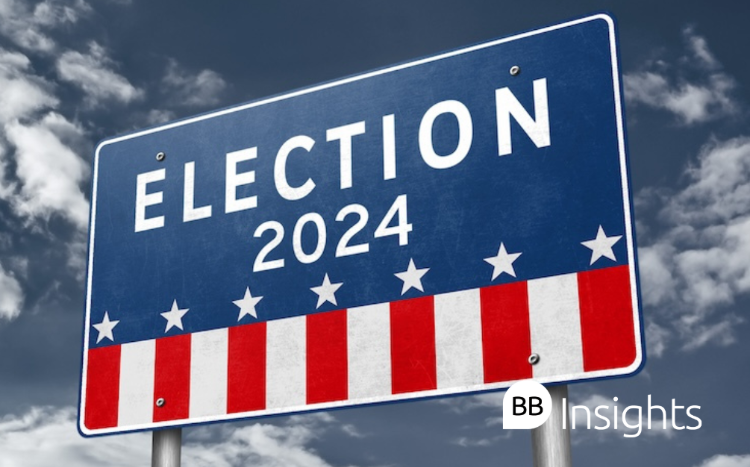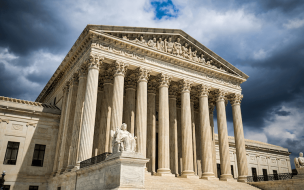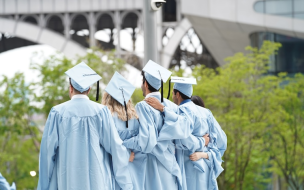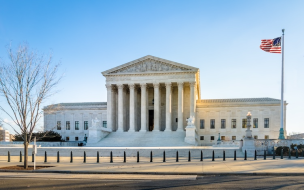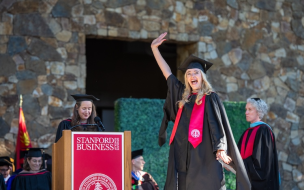Now, with the two candidates confirmed on the ballot, and a change in leadership imminent regardless of the outcome, what could this mean for US business schools and post-graduation opportunities for their students?
From visa policies and immigration reforms to shifts in international student sentiment, find out how the incoming administration could reshape the landscape for MBA and business school candidates.
BusinessBecause asked two experts for their views of the issues:
OPT And Work Visas For Graduates: Opportunities In Flux
For international students, the ability to remain in the US after graduation under the Optional Practical Training (OPT) program is a significant draw, providing the chance to gain work experience before transitioning to longer-term visa options such as the H-1B.
However, policies on immigration and work visas are likely to change, whoever takes office.
Ben Waxman, CEO of International Education Advantage (Intead), is an expert in global student recruitment who advises and aids business schools with marketing strategies and brand building. He explains how the two presidential candidates’ OPT policies might impact enrollment in US institutions.
“If a [presidential] candidate were to restrict OPT, I believe that would lead to a decrease in enrollment. Conversely, if they were to expand OPT—for example, currently, STEM graduates receive three years, while non-STEM graduates only get one year—then allowing all students three years would be significant and could result in considerable growth.”
Ben emphasizes that Trump’s historic anti-immigration stance has meant a presumption about the changes that his administration would likely introduce.

“During the previous Trump administration, they chose to restrict entry from certain countries, such as the Muslim ban, which would undoubtedly limit the flow of international students. This is a significant concern from a policy perspective.”
In contrast, the Biden-Harris administration looked to expand lawful immigration pathways, through the failed bipartisan border deal that would have increased legal immigration and employment-based visas. Harris pushed for this deal in a White House press release urging Republicans to "address it [the border deal] with the urgency and seriousness it requires.”
However, Harris has not stated explicitly how she would address legal immigration and while her website says she will establish an “earned pathway to citizenship” she has not yet provided more details on the shape of it.
Ben spoke to the PIE on the matter and said: “There are strong indicators that a Harris presidency will be supportive of international education and career opportunity growth. If I were placing bets, I’d add more money to the pot on this one.”

H-1B And OPT Visa Limitations: The Wider Impact On The US Workforce
OPT visas and H-1B visas, the non-immigrant work visas that allow US companies to employ skilled foreign workers in temporary occupations requiring specialized knowledge, are essential for international graduates but have a cap that’s remained unchanged for years.
The current annual cap for H-1B visa is 65,000, with 20,000 additional visas for foreign professionals who graduate with a master’s degree or doctorate from a US institution of higher learning
For the 2024 fiscal year, around 781,000 initial H1B visa applications were submitted, but only 24% were selected to complete a petition.
This cap already poses a challenge not only for international students but also for US employers who increasingly rely on this talent pool to fill crucial positions in engineering and computer science, and any further restrictions would significantly impact both parties.
Recent reports, including one funded by the Department of Defense, underscore the urgency of the situation, revealing that the tech industry is in dire need of more workers with expertise in these fields.
This demand highlights the vital role international students play in meeting the workforce needs of the tech sector. And Ben emphasizes the role that incomers contribute to the US economy and tech landscape: “Our tech industry needs more workers and by and large, Americans are not opting for those positions as much as international students are.”

Other Potential Policy Influences On Student Mobility To The US
Beyond immigration, student loan debt and Title IX—a civil rights law that prohibits sex-based discrimination in any school or any other education program—are two further divisive policies that could influence student sentiment.
While Trump opposes student loan forgiveness, Harris advocates for debt relief.
Additionally, Trump’s opposition to protections for transgender students under Title IX contrasts with Harris’ likely extension of these rights, though these issues are unlikely to be decisive factors for most international candidates when considering study in the US, Ben explains.
“Those are intriguing areas. The outcome of either party’s victory would certainly influence the potential for expansion, but it’s difficult to predict whether those efforts would simply become bogged down in Congress and lead nowhere,” he says.
What Else Impacts Students’ Decision About Studying In The US?
International students are already voicing concerns about the unpredictable nature of US immigration and cost of living, says Andrew Crisp, co-founder of CarringtonCrisp, a consultancy for marketing for business schools and universities.
"Given the rising cost of living worldwide, the perception of studying in the US as an expensive option is significant. This concern intensifies for international students, especially when they feel uncertain about their ability to secure work opportunities post-graduation," Andrew explains.
A recent study by CarringtonCrisp revealed that nearly half (49%) of surveyed students, who ranged from undergraduate to masters and MBA applicants, considered the US the most expensive study destination. Germany, with its lower costs and newer facilities, is emerging as a competitive alternative, according to Andrew.
“Relatively speaking, business schools are a new phenomenon in Germany. So, schools there have new facilities. They have a new perspective. All of that is a positive that students might consider as well,” he says.

Is The Election Changing Students’ Plans?
Ben notes a growing cynicism among international students, with many becoming numb to the contentious comments made by Donald Trump in the run up to the election.
A study Intead conducted with Study Portals, shows a growing number of international students view the US political landscape as a “clown show,” as Ben put it, with 45% believing the election outcome won't impact their educational goals—a significant shift from 2016, when many students vowed to avoid the US if Trump won.
This indifference is supported by research from Graduate Management Admissions Council (GMAC), which shows 72% of prospective international students don’t think the election will affect their decision to pursue business education in the US.
Ben describes this new student perspective as both cynical and somewhat misguided, emphasizing that the policies enacted by the next president could significantly impact their study and job prospects.
However, business and finance candidates take a different view, believing that Trump would negatively affect their education. An upcoming StudyPortals/ Intead survey is set to reveal that, before Biden dropped out, 73.5% of respondents favored him over Trump, highlighting a notable disparity in sentiment among students in these fields.
Respondents’ main concerns centered around Trump’s approach to business.
Expressed in free-text responses among aspiring business majors, one key concern was the perception that Trump’s policies favored big businesses over smaller ones and that his economic strategies seemed short-term and didn’t address long-term stability.
Harris is also the preference for current higher education students in the US. A survey by Inside Higher Ed/Generation Lab of over 1000 college students revealed that 57% say they’re going to vote Democrat this November, with around a third of students reporting they are more likely to cast a ballot because she’s top of the ticket.

As the 2024 election approaches, the potential for significant policy changes looms large. The prospect of Kamala Harris becoming president is real, and especially noteworthy as the daughter of two immigrants who studied in the US at UC Berkeley.
“Her presidency could potentially increase interest among international students, highlighting the idea that anyone, regardless of their background, could achieve great things in America,” Ben explains.
Conversely, with Trump’s potential return to the presidency, the future of immigration policy remains uncertain.
“Would he choose to open the floodgates for international students, recognizing their contributions to revenue and innovation in this country? Or would he view them as just another group of immigrants to be restricted? It’s impossible to predict how he would approach that decision,” Ben says.
In this climate of unpredictability, international students are left to navigate their future in the US education system, making informed decisions amid ever-changing policies.
Nevertheless, the likelihood is that top-tier schools such as Harvard, Stanford, and Wharton continue to maintain their appeal for many due to their reputation and global network. Andrew adds, “For those applying to elite schools, the opportunity to study in the US will still be worth the risk. But for others, that calculation is changing.”
Kamala Harris and Donald Trump photographs have been taken from Flickr and are usable under this license and this license.


